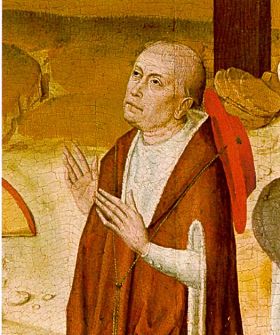374. Opposites Attract: Nicholas of Cusa
The radical negative theology of Nicholas of Cusa, and his hope of establishing peace between the religions of the world.
Themes:
• J. Hopkins (trans.), Nicholas of Cusa on Learned Ignorance: A Translation and an Appraisal of De Docta Ignorantia (Minneapolis: 1981).
• J. Hopkins (trans.), Nicholas of Cusa on God as Not-Other (Minneapolis: 1999).
• J. Hopkins (trans.), Complete Philosophical and Theological Treatises of Nicholas of Cusa, 2 vols (Minneapolis: 2001).
---
• C.M. Bellitto et al. (eds), Introducing Nicholas of Cusa: a Guide to a Renaissance Man (New York: 2004).
• I. Bocken (ed.), Conflict and Reconciliation: Perspectives on Nicholas of Cusa (Leiden: 2004).
• G. Christianson and T. Izbicki (eds), Nicholas of Cusa: In Search of God and Wisdom (Leiden: 1991).
• D. Cürsgen, Die Logik der Unendlichkeit. Die Philosophie des Absoluten im Spätwerk des Nikolaus von Kues (Frankfurt: 2007).
• K. Flasch, Nicolaus Cusanus (Munich: 2001).
• J. Hopkins, A Concise Introduction to the Philosophy of Nicholas of Cusa (Minneapolis: 1978). [Includes translation of De Possest]
• N.J. Hudson, Becoming God: the Doctrine of Theosis in Nicholas of Cusa (Washington DC: 2007).
• E. Meuthen, Nicholas of Cusa: a Sketch for a Biography, trans. D. Crowner and G. Christianson (Washington DC: 2010).
• C.L. Miller, Reading Cusanus: Metaphor and Dialectic in a Conjectural Universe (Washington DC: 2003).
• P. Moffitt Watts, Nicolaus Cusanus: a Fifteenth-Century Vision of Man (Leiden: 1982).
• M. Watanabe, Nicholas of Cusa: a Companion to his Life and his Times (Farnham: 2011).
Stanford Encyclopedia: Nicholas Cusanus







Comments
The conciliation of the…
The conciliation of the opposites may well be our eternal quest, our never ending and persistent trying of returning to the origin whatever that might be. The reintegration after the fragmentation.
Cusa and idealism
Fascinating episode! Was Cusa's work known to his later compatriots, such as GWF Hegel? His dialectics seem strikingly similar to those of the German Idealists.
In reply to Cusa and idealism by Henry King
Cusa and Hegel
I believe not, actually - but he could have exercised influence indirectly, like through Giordano Bruno for instance. I'd be glad to be corrected on this of course!
In reply to Cusa and Hegel by Peter Adamson
Philip Stanfield in his…
Philip Stanfield in his thesis "Hegel the Consummate Neoplatonist" has a chapter entitled "Hegel and Nicholas of Cusa", where he argues that Hegel read Cusa and was indebted to him. I am not in a position to comment on this judgement, which goes strongly against the scholarly grain, but I thought I make a note of it here. His thesis is available on Academia.edu.
Audio Artifact
There is an audio splicing artifact at 3:38.
"the absolute max--- something he tries"
In reply to Audio Artifact by Alexander Johnson
Artifact
Hm, that's odd - I can't hear it. Is it possible it is a glitch at your end? Both my edited file and the streaming here on the site sound ok to me at that point.
In reply to Artifact by Peter Adamson
Artifact
I tested on another device and another network, and had someone else also listen. We all hear the same thing. I'm not sure it is an audio artifact, though. My friend thought it was just an abrupt stop at the end of "absolute maxim" rather than a cut off "absolute maximum"
Not other
How can I find the passage quoted from De non aliud in 8:25?
In reply to Not other by Adria Subirana
Not other
Here you go: "Not-other is not other; nor is it other than other; nor is it other in an other. This for no other reason than that [Not-other] is Not-other, which cannot in any way be other; as if something were lacking to it, as to an other. Because what is other is other than something, it lacks that than which it is other. But because Not-other is not other than anything, it does not lack anything, nor can anything exist outside of it” This is §6 of de Non Aliud, translation taken from J. Hopkins (trans.), Complete Philosophical and Theological Treatises of Nicholas of Cusa, 2 vols (Minneapolis: 2001).
Add new comment